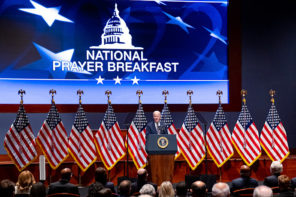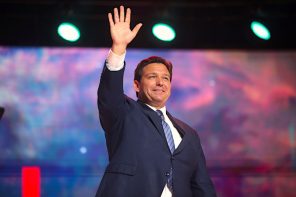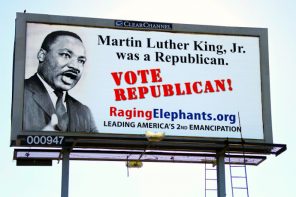The Rev. Rob Schenck, president of the Capitol Hill-based National Clergy Council, a religious right group whose mission is “to bring classical Christian moral instruction to bear on the conversation and debate surrounding public policy and to mobilize the clergy for effective witness and work in the public square,” is “feeling pretty lonely” after his press conference in Isla Vista, California, yesterday, calling on evangelicals to end what he calls their “unholy alliance” with the National Rifle Association.
In an interview this morning, Schenck said that shortly after speaking in Isla Vista he learned of yesterday’s shooting at Seattle Pacific University, a small evangelical institution. “If you [evangelicals] think this was only happening in strange and alien places,” he said, “welcome to our own living room.”
Schenck, a lifelong member of the NRA, admitted that his is a “minority opinion,” but the “unholy alliance” between his brethren and the gun rights behemoth is “a critical theological and moral matter.”
“We need to interrupt the easy access to guns by people who are suffering from mental illness,” he said. “We have to interfere with their ability to access lethal weapons. How that’s done in a technical sense is best left up to professionals,” including law enforcement, legislators, and businesses. Schenck was critical of gun dealers and firearms manufacturers for valuing profits over these concerns, citing the verse from 1 Timothy, “the love of money is the root of all evil.”
Evangelicals, Schenck said, “have been quiet and have not entered robustly into the discussion on the moral and ethical dimensions of firearms ownership and use. We need to have that.” He said he has met with pastors and other church leaders, offering advice on how to address these issues from the pulpit, and said he hopes pastors, Sunday schools, and other Christian education programs begin to teach on the “theological and moral implications” of gun ownership and use. He said he plans to give a formal address on the topic at the annual convention of the Evangelical Church Alliance, which he chairs, in Branson, Missouri in July. Through speaking engagements, private meetings with clergy and religious leaders, and press conferences in Washington and around the country, he hopes to “catalyze a national conversation with church leaders.”
While many conservatives have depicted the Constitution as a divinely-inspired document, Schenck emphasized the “marvelous political instrument” is “not the final moral and ethical authority for the Christian.” He questioned the view that the Second Amendment bars government regulation of gun ownership (a view that the religious right ties with its own advocacy of limited government), arguing that using the Constitution as the “final, ultimate word is theological error for evangelicals. And I want people to think about it in that way. The Bill of Rights is not equal to the Ten Commandments.”
Schenck is attempting to face down a formidable adversary, and he knows it. He has met with evangelical lawmakers, who are “guarded and very cautious,” and who express concern not just about “constitutional boundaries” but about crossing the NRA and the ensuing “backlash” from voters. “A good number of them are afraid of—to use a terrible metaphor—getting into the crosshairs of the NRA and losing their next primary or election.”
The NRA, he said, “is creating a taboo in our culture. Thou shalt not speak of gun regulation. That’s preposterous.” Describing the organization as an “ingenious” political organization, Schenck also criticized how it uses “fear and anger” as a fundraising tool.
“I’d like to open a conversation about the ethical dimensions of that kind of political activity,” Schenck said.
He noted that the NRA, at its last convention, hosted a prayer breakfast, which he said made religion subject to the “overarching dominance and leadership of the NRA agenda,” when it should be “the other way around.”
The NRA, he said, “is doing what a lot of political organizations have done: seeking to co-opt religious exerices and religious people, and that is never good.”
I asked Schenck if he thought he would be welcome at the Conservative Political Action Conference or the Values Voters Summit with his message. “Right now there are knee jerk reactions. Is Schenck abandoning us? Is he going liberal?” he said.
“My objective is not a political one,” he said. “It is a matter of Christian formation, and good and healthy spirituality. And that’s why I say our authority on big questions of life and death like this is not the NRA, or even the Second Amendment. Our authority rests in holy scripture, prayer, and Christian reflection.”




